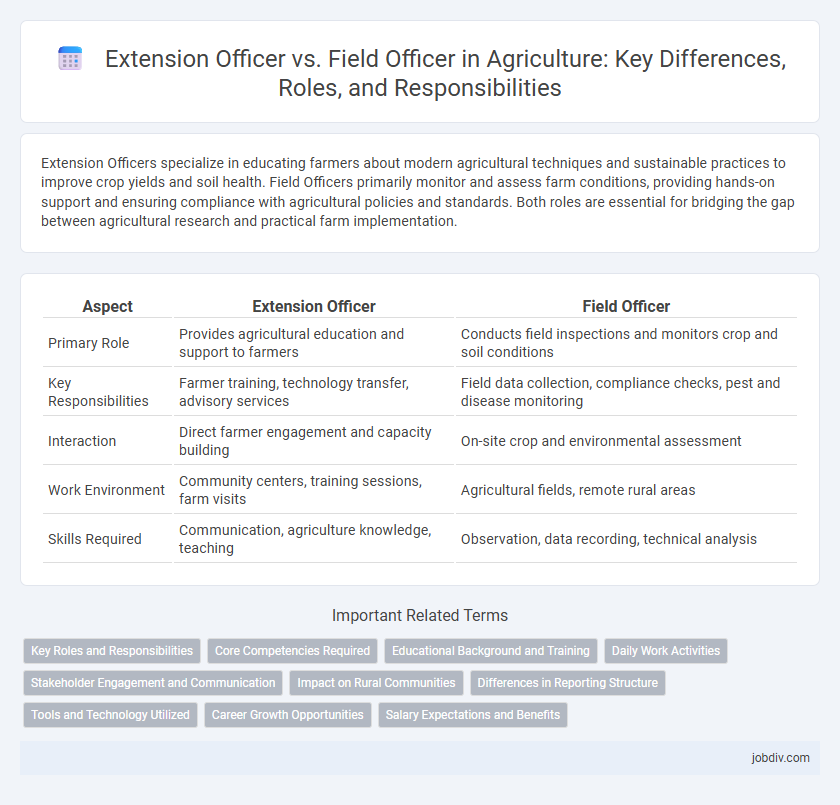Extension Officers specialize in educating farmers about modern agricultural techniques and sustainable practices to improve crop yields and soil health. Field Officers primarily monitor and assess farm conditions, providing hands-on support and ensuring compliance with agricultural policies and standards. Both roles are essential for bridging the gap between agricultural research and practical farm implementation.
Table of Comparison
| Aspect | Extension Officer | Field Officer |
|---|---|---|
| Primary Role | Provides agricultural education and support to farmers | Conducts field inspections and monitors crop and soil conditions |
| Key Responsibilities | Farmer training, technology transfer, advisory services | Field data collection, compliance checks, pest and disease monitoring |
| Interaction | Direct farmer engagement and capacity building | On-site crop and environmental assessment |
| Work Environment | Community centers, training sessions, farm visits | Agricultural fields, remote rural areas |
| Skills Required | Communication, agriculture knowledge, teaching | Observation, data recording, technical analysis |
Key Roles and Responsibilities
Extension Officers primarily focus on educating farmers through training sessions, demonstrations, and dissemination of the latest agricultural practices and technologies to improve crop yields and farming efficiency. Field Officers concentrate on on-site supervision, data collection, and direct support, ensuring compliance with agricultural programs and addressing field-level challenges like pest management and resource allocation. Both roles are critical for bridging the gap between research institutions and farmers, promoting sustainable agricultural development.
Core Competencies Required
Extension Officers require strong communication skills, expertise in agronomy, and the ability to conduct training sessions for farmers. Field Officers must possess technical knowledge in crop management, data collection skills, and proficiency in field assessments to monitor agricultural activities accurately. Both roles demand problem-solving abilities and a deep understanding of local agricultural practices to enhance farm productivity effectively.
Educational Background and Training
Extension Officers typically possess a degree in agricultural science, agronomy, or related fields, emphasizing community outreach and farmer education. Field Officers often have specialized training focused on practical farm management, crop production techniques, and hands-on agricultural practices. Both roles require continuous professional development, but Extension Officers prioritize communication skills and advisory methods, while Field Officers concentrate on technical know-how and field-based problem solving.
Daily Work Activities
Extension Officers primarily engage in educating farmers by conducting training sessions, demonstrating new agricultural techniques, and distributing informational materials. Field Officers focus on on-site supervision, monitoring crop health, collecting data, and ensuring the implementation of agricultural practices aligns with organizational guidelines. Both roles collaborate to enhance farm productivity but differ in their approach: Extension Officers emphasize knowledge transfer, while Field Officers prioritize operational oversight.
Stakeholder Engagement and Communication
Extension Officers specialize in facilitating knowledge transfer and training farmers through personalized communication, ensuring adoption of best agricultural practices. Field Officers engage directly with multiple stakeholders including farmers, suppliers, and local authorities, coordinating field activities and gathering real-time feedback to improve program implementation. Both roles emphasize effective stakeholder engagement but differ in scope, with Extension Officers focused on education and Field Officers managing operational communication.
Impact on Rural Communities
Extension Officers play a critical role in rural communities by delivering agricultural education and innovative farming techniques that boost productivity and sustainability. Field Officers, on the other hand, focus on monitoring and implementing development projects, ensuring resources reach smallholder farmers effectively. Together, their complementary efforts enhance food security, increase farmers' income, and promote rural economic development.
Differences in Reporting Structure
Extension Officers typically report to agricultural department managers or senior extension service coordinators, focusing on training and resource distribution to farmers. Field Officers report directly to project supervisors or field operation managers, prioritizing ground-level monitoring and data collection for program implementation. This difference in reporting structure influences their roles, with Extension Officers emphasizing advisory services and Field Officers concentrating on operational fieldwork.
Tools and Technology Utilized
Extension Officers utilize digital platforms like mobile apps and Geographic Information Systems (GIS) to deliver real-time agricultural advisories and monitor crop health effectively. Field Officers primarily employ soil testing kits, moisture sensors, and handheld GPS devices for on-site data collection and immediate field assessments. Both roles integrate remote sensing technologies and precision agriculture tools to improve crop productivity and resource management.
Career Growth Opportunities
Extension Officers typically have broader career growth opportunities due to their role in community engagement, training, and policy influence within agricultural development. Field Officers often gain specialized technical skills through direct farm-level interventions, which can lead to advancement into supervisory or agronomy expert roles. Both positions offer pathways to leadership, but Extension Officers generally have greater potential for roles in strategic planning and program management.
Salary Expectations and Benefits
Extension Officers in agriculture typically earn a higher salary range than Field Officers due to their specialized skills in farmer training and advisory services, often with annual salaries between $45,000 and $70,000. Field Officers generally receive salaries from $35,000 to $55,000, reflecting their role in on-ground monitoring and data collection. Benefits for Extension Officers often include professional development opportunities and performance bonuses, while Field Officers may receive field allowances and transport reimbursements.
Extension Officer vs Field Officer Infographic

 jobdiv.com
jobdiv.com